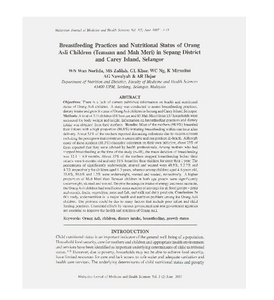Citation
W. N., Wan Norlida and Mohd Shariff, Zalilah and Khor, Geok Lin and Ng , W. C. and Kandiah, Mirnalini and Abdul Ghani, Nawalyah and Abdul Rahman, Hejar
(2007)
Breastfeeding practices and nutrional status of Orang Asli children (Temuan and Mah Meri) in Sepang district and Carey Island, Selangor.
Malaysian Journal of Medicine and Health Sciences, 3 (2).
pp. 1-15.
ISSN 1675-8544
Abstract
Objectives: There is a lack of current published information on health and nutritional status of Orang Asli children. A study was conducted to assess breastfeeding practices, dietary intake and growth status of Orang Asli children in Sepang and Carey Island, Selangor.
Methods: A total of 173 children (88 Temuan and Mah Meri) from 137 households were measured for for body weight and height. Information on breastfeeding practices and dietary intake was obtained from their mothers.
Results: Most of the mother (98.9%) breastfed their infants with a high proportion (86.8%) initiating breastfeeding within one hour after delivery. About 53% of the mothers reported discarding colostrum due to various reasons including the perception that colostrum is undesirable and can produce ill-health. Although many of these mothers (58.3%) discarded colostrum on their own initiative, about 25% of them reported that they were advised by health professionals. Among mothers who had stopped breastfeeding at the time of the study (n=48), the mean duration of breastfeeding was 12.1±8.9 months. About 33% of the mothers stopped breastfeeding before their infants were 6 months old and only 31% breastfed their children for more than 1 year. The percentages of significantly underweight, stunted and wasted were 48.9%, 5.2.2% and 4.3% respectively for children aged 1-3 years, whereas among children aged 4-6 years old, 35.8%, 50.6% and 1.3% were underweight, stunted and wasted, respectively. A higher proportion of Mah Meri than Temuan children in both age groups were significantly underweight, stunted and wasted. Despite the adequate intake of energy and most nutrients, the Orang Asli children had insufficient mean number of servings for all food groups - grain and cereals, fruits, vegetables, meat and fish, and milk and dairy products.
Conclusion: In this study, undernutrition is a major health and nutrition problem among the Orang Asli children. The problem could be due to many factors that include poor infant and child feeding practices. Concerted efforts by various government and non government agencies are essential toto improve the health and nutrition of Orang Asli.
Download File
![[img]](http://psasir.upm.edu.my/32904/1.hassmallThumbnailVersion/1.%20Breastfeeding%20Practices%20and%20Nutrional%20Status%20of%20Orang%20Asli%20Children%20%28Temuan%20and%20Mah%20Meri%29%20in%20Sepang%20District%20and%20Carey%20Island%2C%20Selangor.pdf)  Preview |
|
PDF
1. Breastfeeding Practices and Nutrional Status of Orang Asli Children (Temuan and Mah Meri) in Sepang District and Carey Island, Selangor.pdf
Download (7MB)
| Preview
|
|
Additional Metadata
Actions (login required)
 |
View Item |

